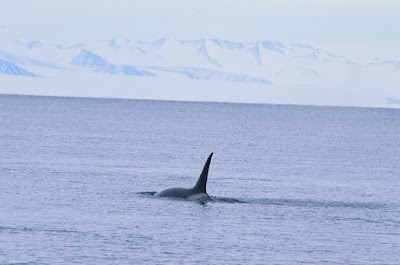The third question I asked this group of Year 9 and 10 students was "would you like to go to Antarctica? why, or why not?"
Their answers were:
Yes: 51
No: 29
(with a few Maybes, or Both).
Interestingly, 24 of the 29 "No"s were because it was "too cold!" Some students worried that it was too isolated, lonely and/or dangerous, or they wanted to travel to other places first.
You have to take a boat there and I get sea sick.
Not really because that’s not my paradise place.
No because it’s cold and lonely, and it’s very big and you could get lost and die.
I don’t tolerate the cold very well. it would be a cool experience for others but I wouldn’t enjoy it personally.
Too cold I would rather go to Fiji.
You have to take a boat there and I get sea sick.
Not really because that’s not my paradise place.
No because it’s cold and lonely, and it’s very big and you could get lost and die.
I don’t tolerate the cold very well. it would be a cool experience for others but I wouldn’t enjoy it personally.
Too cold I would rather go to Fiji.
Or, more bluntly:
But many of the students who answered Yes talked about what a great experience it would be, and they also wanted to see the animals:
I would love to study the birds there. I want to see the penguins and all the snow. I want to see a real penguin in its real environment. I like whales and penguins. I love the animals there.
Yes because I like to travel and explore and it’s not a usual place to go. I’d like to find out more about it. Because it would be an amazing experience and could inspire me to write about something. I would love to go there because you would learn a lot and it would be really enjoyable.
I would love to go it would be such a great experience and the sights would be so amazing.
Some students had specific goals in mind:
I would love to go it would be such a great experience and the sights would be so amazing.
 |
| Orca whale. Photographer: Tim Higham. |
Some students had specific goals in mind:
I would like to buy a snow cone there.
I want to see that colourful thing in the sky!
Even the students who said Yes were a bit worried about the weather:
I would like to go for adventure but not for the cold. Only for a little bit because I don’t like the cold. Yes, but it would be cold.
One summed up the dilemma perfectly:
It would be cool but it would be cold
And some were, admittedly, ready to go anywhere:
Yes because I haven’t been out of New Zealand.
I would go anywhere if I had the chance besides the North Island.
Only if it is free.
But there were also some fabulous enthusiastic replies:
I would love to go to Antarctica and explore and do research.
It will be a new experience and something I have never done before. It would also be cool to see all the different species of animals that live there.
I would love to see the aurora lights in person. I also want to see what animals are like in their natural habitat.
Yes I would like to go there because I like the cold and it would be cool to see penguins in their own habitats. It would be really cool to see ice and water all around. It would also be awesome to see killer whales.
Here are two of the best and I can agree with both of them:
Yes! I think it would be life changing.
Because there are not many places like Antarctica.
Because there are not many places like Antarctica.
 |
| Moonlight at Cape Evans. Photographer: Richard McBride. |
(Thanks to the ADAM website for these great photos, and thanks again to the students of Freyberg High School and St Peters College for their great responses.)














